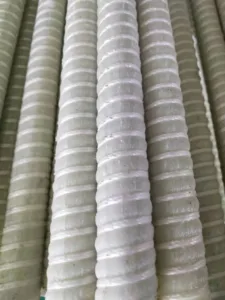In the realm of construction and infrastructure development, the choice of materials plays a crucial role in determining the longevity, stability, and overall quality of projects. One innovative solution that has gained significant traction is fiberglass rebar. Unlike traditional steel rebar, fiberglass rebar offers a range of advantages that are particularly well-suited for challenging environments. As construction demands continue to grow in the Midwest, finding reliable distributors of fiberglass rebar becomes essential. In this article, Unicomposite composite profiles will delve into the benefits of fiberglass rebar and guide you through the process of locating trustworthy distributors in the Midwest.

fiberglass rebar distributors midwest
Introduction
In recent years, the construction industry has witnessed a shift towards innovative materials that offer enhanced performance and durability. One such material that has emerged as a game-changer is fiberglass rebar. As construction projects become more diverse and challenging, the need for reinforcement materials that can withstand corrosive environments and heavy loads has become paramount. This article explores the unique properties of fiberglass rebar and its significance in Midwest construction.
Understanding Fiberglass Rebar
What is Fiberglass Rebar?
Fiberglass rebar, also known as GFRP (Glass Fiber Reinforced Polymer) rebar, is a composite material crafted from high-strength glass fibers embedded in a polymer matrix. This composition gives fiberglass rebar impressive tensile strength while maintaining a lightweight profile.
Advantages over Steel Rebar
Traditional steel rebar has been the go-to choice for reinforcing concrete structures for decades. However, fiberglass rebar offers a set of advantages that make it a compelling alternative:
- Corrosion Resistance: Unlike steel, fiberglass rebar does not corrode when exposed to harsh chemicals or saltwater. This makes it ideal for structures in coastal or chemically aggressive environments.
- Lightweight and Easy to Handle: Fiberglass rebar is significantly lighter than steel, easing transportation, installation, and reducing labor costs.
- Thermal Insulation Properties: Unlike steel, which conducts heat, fiberglass rebar has insulating properties. This is particularly useful in regions with extreme temperature variations like the Midwest.
- Durability and Longevity: Fiberglass rebar does not rust, ensuring the longevity of structures and reducing maintenance requirements.
The Midwest Construction Landscape
The Midwest region of the United States is characterized by a diverse range of construction projects, including roads, bridges, buildings, and more. The extreme temperature fluctuations and exposure to de-icing agents in winter, as well as humidity and high heat during summers, pose challenges to traditional construction materials. Enter fiberglass rebar, a versatile solution that aligns perfectly with the demands of Midwest construction.
Why Choose Fiberglass Rebar in the Midwest
Corrosion Resistance
In the Midwest, where weather patterns can be unpredictable and harsh, corrosion-resistant materials are a must. Fiberglass rebar’s immunity to rust and corrosion ensures the structural integrity of projects even in the face of extreme conditions.
Lightweight and Easy to Handle
The lightweight nature of fiberglass rebar simplifies handling, transportation, and installation. This is particularly advantageous in projects spanning vast distances or requiring intricate detailing.
Thermal Insulation Properties
Midwest weather can be unforgiving, with temperature variations that challenge the stability of structures. Fiberglass rebar’s insulating properties help mitigate the expansion and contraction issues caused by temperature changes, ensuring the longevity of projects.
Durability and Longevity
In the Midwest’s demanding environment, the durability of construction materials is non-negotiable. Fiberglass rebar’s resistance to corrosion, rust, and degradation makes it an attractive choice for projects that need to withstand the test of time.
Finding Reliable Fiberglass Rebar Distributors
As the advantages of fiberglass rebar become evident, sourcing the material from reliable distributors becomes crucial. Here’s how to go about it:
Research and Recommendations
Start by researching reputable distributors in the Midwest. Seek recommendations from colleagues and industry peers who have used fiberglass rebar in their projects.
Comparing Pricing and Services
Obtain quotes from different distributors and compare pricing. Remember, while cost is important, the quality of the material and the distributor’s services are equally crucial.
Quality Assurance and Certifications
Ensure that the distributor adheres to quality standards and possesses relevant certifications. This guarantees that you’re receiving genuine, high-quality fiberglass rebar.
Customer Reviews and Testimonials
Go through customer reviews and testimonials to gauge the distributor’s reputation and customer satisfaction level. This provides valuable insights into the distributor’s track record.
Local Presence and Timely Delivery
Opt for a distributor with a local presence in the Midwest. This not only aids in faster delivery but also facilitates quick responses to any queries or concerns.
Making an Informed Decision
Incorporating fiberglass rebar into your construction project is a strategic move that requires careful consideration. By selecting a reputable distributor, you’re ensuring the success and longevity of your project while harnessing the benefits of this innovative material.
FAQs About Fiberglass Rebar
What is the manufacturing process of fiberglass rebar?
The manufacturing process involves pulling continuous glass fibers through a resin bath, followed by curing to create the final composite rebar product.
Is fiberglass rebar more expensive than traditional steel rebar?
While fiberglass rebar can be initially more expensive, its long-term benefits in terms of durability and maintenance often outweigh the upfront cost.
Can fiberglass rebar be used in all types of construction projects?
Yes, fiberglass rebar can be used in a wide range of construction projects, from bridges and highways to buildings and marine structures.
How does fiberglass rebar contribute to sustainability?
Fiberglass rebar’s corrosion resistance and extended lifespan contribute to reduced maintenance needs, conserving resources in the long run.
Are there any limitations to using fiberglass rebar?
Fiberglass rebar may have limitations in high-temperature environments, as excessive heat can affect its structural integrity.
Conclusion
In the world of construction, adaptation to innovative materials is key to creating enduring structures. Fiberglass rebar stands as a testament to the industry’s evolution, offering unmatched advantages in terms of durability, corrosion resistance, and ease of use. As the Midwest continues to develop and expand, the role of reliable fiberglass rebar distributors becomes indispensable. Access the future of construction now by exploring the benefits of fiberglass rebar.
 info@unicomposite.com
info@unicomposite.com


























